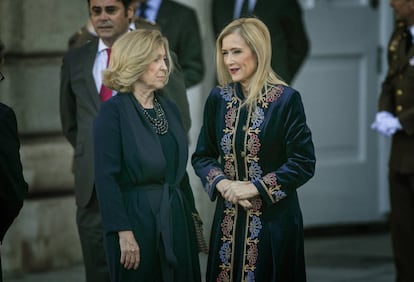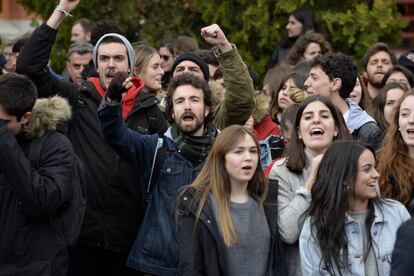Madrid premier returns controversial master’s degree, but blames university
Cristina Cifuentes has been under pressure to resign ever since irregularities relating to her academic qualification emerged

Madrid regional premier Cristina Cifuentes is returning a controversial master’s degree that has endangered her political career, but is placing the blame for any irregularities squarely with the university in question.
Speaking at a press conference on Tuesday, Cifuentes told the press: “I have never said my master’s degree was not legitimate. I have not committed any illegal act. I have an official title with all the accreditation certificates, stamped and certified by the department.”
I was offered a set of requirements that I don’t believe were either better or worse than those offered to other people in similar circumstances
Cristina Cifuentes, Madrid premier
In a letter to the president of King Juan Carlos University (URJC), Javier Ramos, Cifuentes apologized to “anyone who may have felt wronged” by the “easy conditions” that she was offered by the university, where she obtained a master’s degree in public law in 2012 without attending classes or taking exams.
“I was offered a set of requirements that I don’t believe were either better or worse than those offered to other people in similar circumstances as myself,” wrote Cifuentes, who in 2012 was the central government’s delegate in Madrid. “If the university had not offered this possibility, I simply wouldn’t have enrolled in the degree.”
Other irregularities concerning her final thesis have led to a criminal probe by prosecutors over alleged forgery of public documents by university officials. The growing scandal may affect Cifuentes’ chances of running for re-election in 2019, as her Popular Party (PP) seeks to distance itself from yet another scandal.
Cifuentes meanwhile has said she has no intention of stepping down: “I have no plans to resign because there are no objective reasons to do it,” she said at the press conference. “I have the support of my party and my president.”
The Madrid regional leader did however, promise to follow any decision the PP makes about her political future. “I am always, always going to do what my party says. I am not going to cause controversy.”
Political fallout
The opposition Socialists in the regional assembly recently filed a no-confidence motion against Cifuentes with support from Podemos. And Ciudadanos, whose support is pivotal to the PP government, has asked for her resignation and for an interim leader to head the region until next year’s election. So far, Cifuentes has refused to resign, saying she did nothing wrong. But returning the degree is not appeasing the opposition.
Renunciar al máster es una condición necesaria, pero no suficiente. Cifuentes tiene que dimitir. Ha mentido y se ha valido de su posición institucional para beneficiarse de un máster. Madrid merece un tiempo nuevo con @equipoGabilondo al frente.#SánchezLasMananasRNE
— Pedro Sánchez (@sanchezcastejon) April 17, 2018
"Giving up on the degree is a necessary condition, but not enough. Cifuentes must resign. She lied and used her institutional position to benefit from a master's degree. Madrid deserves a new period under the Gabilondo team," tweeted Socialist Party leader Pedro Sánchez, alluding to the party candidate to head the region, Ángel Gabilondo.
Ciudadanos spokesman Ignacio Aguado said that Cifuentes' letter was "a confession, admitting that she received favorable treatment from a public university." And top Podemos official Irene Montero added that "all that is left is for her to ask the university for a refund."
The PP meanwhile has continued the same line of defense as Cifuentes and blamed the university. “The issue of the master’s degree is now in the hands of the justice system and we hope the administrative errors and infringements the university has appeared to have committed are clarified as soon as possible,” said Enrique Ossorio, the PP spokesman in the Madrid assembly.

University ethics
The case has also raised new ethical concerns about a public university where a former president was forced to resign over a plagiarism scandal. The current president, Javier Ramos, has publicly denied any personal wrongdoing and today published a column in EL PAÍS promising to root out corrupt practices at his institution.
“From now on, and we are already doing so, we will take all necessary decisions to guarantee that bad practices that we detect do not take place again, but also to act decisively and in collaboration with the judiciary against all those individuals who are responsible for this loss of prestige,” wrote Ramos.
An online daily recently revealed that Cifuentes never attended classes or took examinations with the other students. A university employee later altered her grades transcript to make it look as if she had completed her coursework. Cifuentes’ final thesis never turned up, and while she claims to have defended it on July 2 of that year before a three-member panel, no official records exist of that event, university officials said.
Pressed for evidence, Cifuentes produced a university document signed by the three members of the examining panel. It later emerged that at least two of the signatures were forged, and the case was taken up by prosecutors, as forgery of public documents is a crime that carries prison sentences.
Cifuentes said the university sent her this document, and Enrique Álvarez Conde, the head of the URJC Public Law Institute where she obtained her degree, made public statements denouncing pressure from top university officials who urged him to produce documents to back up Cifuentes on the same day that the scandal broke in the news.
University president Ramos has denied that he personally pressured Álvarez Conde. On Friday, he presided over a meeting of officials, who decided to suspend the Institute director. In another decision, all of the university’s schools will undergo an internal investigation. The university employee who altered Cifuentes’ transcript has been sanctioned.
It later emerged that a second top PP politician, Pablo Casado, also obtained a similar degree from the same university in 2009 without going to class, taking exams or producing a final thesis. He said the university offered him these conditions.
English version by Susana Urra.
Tu suscripción se está usando en otro dispositivo
¿Quieres añadir otro usuario a tu suscripción?
Si continúas leyendo en este dispositivo, no se podrá leer en el otro.
FlechaTu suscripción se está usando en otro dispositivo y solo puedes acceder a EL PAÍS desde un dispositivo a la vez.
Si quieres compartir tu cuenta, cambia tu suscripción a la modalidad Premium, así podrás añadir otro usuario. Cada uno accederá con su propia cuenta de email, lo que os permitirá personalizar vuestra experiencia en EL PAÍS.
¿Tienes una suscripción de empresa? Accede aquí para contratar más cuentas.
En el caso de no saber quién está usando tu cuenta, te recomendamos cambiar tu contraseña aquí.
Si decides continuar compartiendo tu cuenta, este mensaje se mostrará en tu dispositivo y en el de la otra persona que está usando tu cuenta de forma indefinida, afectando a tu experiencia de lectura. Puedes consultar aquí los términos y condiciones de la suscripción digital.








































